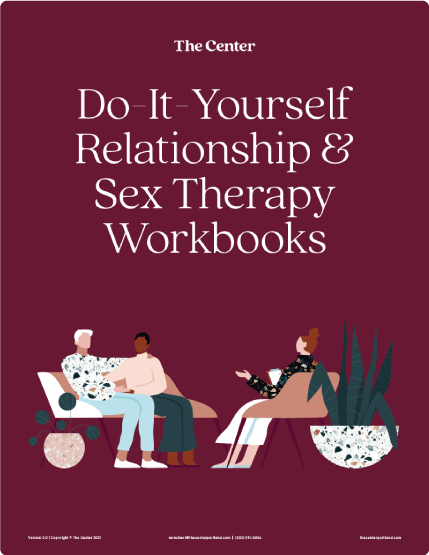Do you ever notice that there’s tons of articles about “spicing it up in the bedroom” and “tips for being great in bed”, but something none of these articles ever seem to talk about is how hard that subject can be to broach? In my practice as a sex therapist, I talk with a lot of people who would like to experiment with sex, but find they get stuck at the first step – bringing it up.
Even when we both agree that we’d like to try something different or new, taking the leap of actually saying what we would like to try out loud can be so daunting that we end up just…not. If you’ve found yourself stuck in this place, I hope to talk about some things I’ve learned that can make this conversation a little bit easier.
But Why is it So Hard?
If you find that talking about what you and your partner(s) would like sexually is hard, first know that you’re not alone. A lot of people struggle with this same issue!
There are a lot of things that can make it hard, but some of the most common are not feeling like we can talk about sex at all (thank you society that has made sex a taboo subject and never taught us how to talk about it openly!), fear that we will offend or disappoint each other if we aren’t interested in the same things, and fear that if we tell our partner something we’re into or interested in exploring, they’ll be grossed out and reject us.
The Erotic Curiosity Spectrum
One thing that I have found is really helpful in chilling out some of these fears is understanding the erotic curiosity spectrum, a concept I learned from Dr. Tammy Nelson’s Getting the Sex You Want. Put simply, this is the idea that there is a whole range of ways for something to be eroticized – i.e. there’s not just “that’s gross” and “I want to do that”, there’s a whole range of things in between.
At one far end of the spectrum is erotic curiosity, which are random sexual thoughts that may pique your interest, or which may seem weird or uncomfortable to you. These are thoughts that you aren’t purposefully making happen, but come up naturally. From here you may be interested in that thought, or decide “not for me!”
Next is personal fantasy, something that it’s hot for you to think about in the privacy of your own brain but you might not want to share with your partner, for a variety of reasons. Closer to the center is shared fantasy – this is something that you would like to be able to talk about with your partner or imagine doing, but aren’t interested in actually doing, again for a whole host of reasons.
Finally, there is erotic action – the stuff you want to do! Any one item may fall anywhere along these points, and often in between. Something to remember is that just because you or your partner has a thought about something, doesn’t mean you are interested in it, and just because you are interested in something, doesn’t mean that you actually want to do it, and just because you might actually want to do something, doesn’t mean either of you is saying that the other person has to.
I find that thinking about sexual interest and exploration in this way can help us slow down our immediate reactions to our own thoughts, interests, and curiosities, and can help us contextualize our partner’s too. A lot of the fear of talking about sex and our interests comes from worrying that our partner will be grossed out, or feel pressured to do something. Going into that conversation with language to talk about things that are curiosities, interests, fantasies, or desired actions can help us communicate clearly.
Accepting Our Yucks and Our Yums
Have you ever heard the phrase, “don’t yuck someone else’s yum?” The idea behind this is one of nonjudgment, and it can be really helpful for addressing fears about disappointing each other if we aren’t into the same things. Nonjudgment means that you are not passing judgment (i.e. labelling something as “good” or “bad”, or in this case “hot and sexy” or “gross and disgusting”) on what your partner finds erotic or is interested in trying out.
A hard fact to accept is that sometimes we do feel a visceral, uncomfortable “gross out” feeling when we think about some sexual things, just like we get grossed out by some specific foods. Having that feeling is involuntary, and doesn’t mean we are passing judgment – but how we talk about it does matter.
I think “squick”, a word I’m borrowing from online erotica spaces, can be very helpful. This is a way of saying, “that’s just not for me!” Officially, it means to have a visceral negative emotional reaction to something, while holding and understanding that this doesn’t make that thing inherently gross or bad.
For example, I might LOVE sushi, but my partner might be squicked out by the idea of raw fish. My partner isn’t saying that I am gross or bad, or even that sushi is necessarily inherently gross or bad, but that they personally find it unpleasant.
This doesn’t even necessarily mean we can’t go out to sushi restaurants – I just need to take my partner’s feelings into account and go on my own, or find ones that serve other food too. When we can approach a sexual activity that one of us is interested in but the other isn’t like this, it gives us more options than “we’re both extremely into that” or “we can never incorporate any of this desire into our sex life.”
SUMMARY:
These tools can help us create more safe space to talk, but what they can’t do is eliminate the possibility for disappointment all together. It’s impossible – disappointment is a natural emotion to feel when we hoped for something, or were excited for something, but it turns out that’s not how things are going to be.
The idea of accepting that we will feel some disappointment and learning how to be okay with both feeling disappointing and saying something that might disappoint our partner is hard, but avoiding the possibility of anyone ever feeling that feeling at all costs is often what keeps us stuck, unable to talk about the things we want sexually at all. If it feels like that barrier is too much to overcome for you and your partner right now, and that’s something you want to change, sex therapy at The Center might be able to help you work through that barrier.
I often work with clients on processing what confronting those difficult feelings would mean, and how they can help themselves learn to love the messy, complicated emotions that come with exploring our sexual desires.
If you’d like more tools to help you and your partner explore your sexual desires, be sure to check out my next article – Creating a Roadmap for Sexual Adventure: The Yes, No, Maybe List. Or, if you don’t want to wait, you can reach out to our new client scheduler ([email protected]) and ask about openings! We have a great team of clinicians who would love to help.







